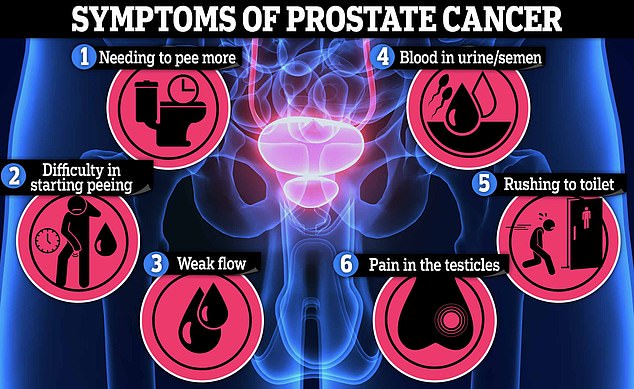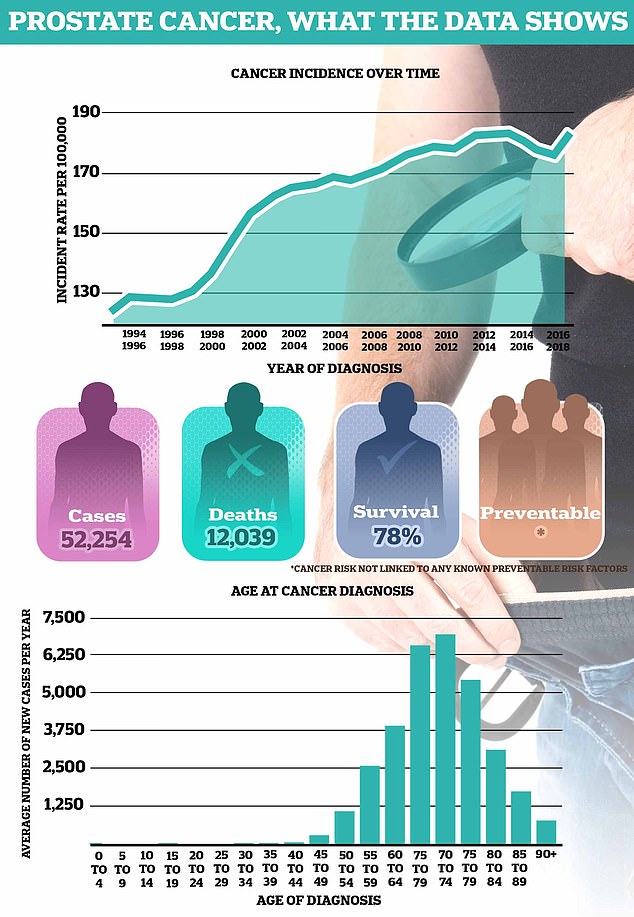Today ministers have been asked to place sanitary bins in public men’s toilets to prevent tens of thousands of men from suffering in silence.
Around one in three men aged over 65 in the UK suffer from urinary incontinence.
But under current laws, it is only necessary to provide sanitary bins for female staff in the workplace to dispose of used tampons and sanitary pads.
Most public women’s bathrooms also include them, although there is no such provision for men.
Campaign group Boys Need Bins, backed by Prostate Cancer UK, wants this to change.
This week, businesses and public buildings across Worcestershire began installing these bins, after a patient wrote to organizations across the county. Ian Smith (pictured), 64, the patient who drove the change was diagnosed with advanced prostate cancer in 2022

It comes as businesses and public buildings across Worcestershire this week began installing these bins, after a patient wrote to organizations across the county.
Ian Smith, 64, the patient who championed the change, was diagnosed with advanced prostate cancer in 2022.
While he had regularly undergone prostate-specific antigen testing to detect the disease, which affects around one in eight men at some point in their lives, this was interrupted by Covid.
By the time his cancer was identified, it had spread to the rectum and is now incurable.
After radiotherapy and hormonal treatment, he now suffers from bowel incontinence and has to wear adult diapers.
He told the BBC: “Due to my treatment, I suffered damage to my intestines and rectum and this sometimes caused bowel incontinence.
‘What I use are full diaper pants… These are a real problem if you need to get rid of them, which is what the Boys Need Bins campaign is all about.
“Because the guys are what they are, they don’t talk about it… and that’s why most store owners don’t know it’s a problem.”
According to Prostate Cancer UK, one in 20 men aged 60 and over will experience bowel incontinence.
And the shame and panic surrounding the issue can lead to them leading less fulfilling lives, the charity warned.
The charity says more than a third of men with incontinence will avoid leaving the house due to leaks and problems disposing of pads and nappies, which can cost between 50p and £1 each, increasing their risk of social isolation.
Their research also shows that a similar number continue to use dirty sanitary pads, rather than trying to find a place to dispose of them.
“It’s a much bigger problem than people tend to believe,” said Nick Ridgman, head of health information and clinical support at Prostate Cancer UK.
‘Hundreds of thousands of men experience incontinence. But what we don’t have for these men is the kind of provision we have in women’s bathrooms.”
Last year, the island of Jersey passed a law requiring sanitary bins in all public men’s toilets, and Winchester City Council in Hampshire has voluntarily installed them in its men’s toilets.
Meanwhile, hygiene specialist PHS Group has already installed them at the Moto group’s approximately 60 motorway service stations.

More than 52,000 men are diagnosed with prostate cancer each year on average in the UK, making it the most common cancer in men. Around 12,000 men die each year from this disease, the equivalent of one every 45 minutes.
Last summer, Women’s Minister Maria Caulfield said the government was also investigating the issue.
A spokesperson for the government watchdog, the Health and Safety Executive, said it was currently reviewing regulations and guidance on the provision of disposal facilities in workplace toilets, to ensure they meet the needs of both women and men. men.
Around 52,000 men are diagnosed with prostate cancer each year.
But 9,000 men a year are diagnosed once it has spread, making it the second most common cause of cancer death in men after lung cancer.
The risk of prostate cancer increases with age, with most cases diagnosed in men aged 50 and over, the NHS says.
Symptoms include needing to urinate more frequently, having to wait longer before being able to urinate, erectile dysfunction, blood in the urine, weight loss, or any new, unexplained lower back pain.
Among the celebrities diagnosed with prostate cancer is Stephen Fry, who said he was “shocked” after discovering he had the disease in 2018.
In 2022, musician Jools Holland revealed that he had been successfully treated for prostate cancer after a diagnosis in 2014.
In August, Prostate Cancer UK also announced that referrals for the disease had reached a record level in the last year (an increase of 17 per cent) thanks to the ‘Bill Turnbull’ effect.
They said they believe the death of the ambassador and television host encouraged men to get tested.


